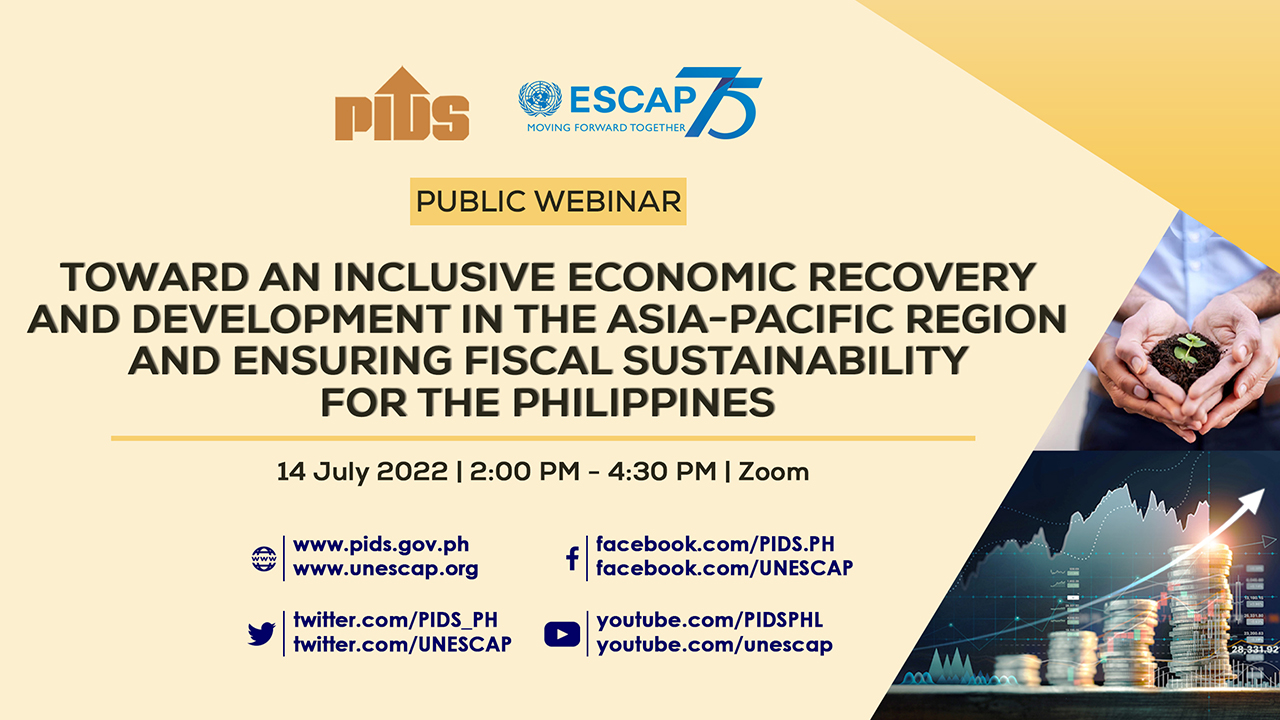
The Philippine Institute for Development Studies (PIDS), in partnership with the United Nations Economic and Social Commission for Asia and the Pacific (UNESCAP), will hold a public webinar on July 14, 2022, from 2:00 PM to 4:30 PM via Zoom.
This virtual event will feature two presentations. The first is UNESCAP’s Economic and Social Survey of Asia and the Pacific 2022. This 75th anniversary issue of the Survey argues that Asia-Pacific economies must prioritize inclusive growth—whereby citizens of all socioeconomic groups are able to improve their livelihoods, incomes, health, and education levels. The report has six chapters tackling building a fairer future, macroeconomic performance, fiscal policy choices, central banking, structural transformation, and towards a fairer future. The full report and infographics may be downloaded at https://www.unescap.org/kp/2022/economic-and-social-survey-asia-and-pacific-2022.
The second presentation is the PIDS study titled “Fiscal Effects of the COVID-19 Pandemic: Assessing Public Debt Sustainability in the Philippines” authored by Senior Research Fellow Margarita Debuque-Gonzales, Research Fellow Justine Sicat, and Research Associate John Paul Corpus. Their paper examines whether the current level of debt in the country, given the national government’s fiscal policy and plans, remains on a sustainable path. The results suggest that the country’s debt position today is less worrisome than it had been during previous debt crises, and that the debt-to-GDP ratio will remain manageable despite peaking above 65 percent over the next couple of years. Given the need to spend to prevent possible scarring from the pandemic and give the economy time as well as room to recover from the pandemic crisis, it may not be feasible to immediately return to pre-COVID-19 debt ratios, based on fiscal gap computations. This underscores the need for a sound medium- to long-term fiscal consolidation plan to anchor sentiments. Fiscal reaction functions for the Philippines and similar economies in the region, meanwhile, indicate responsible fiscal policy that guarantees fiscal solvency. This presupposes, however, the absence of major fiscal policy reversals, especially of hard-won fiscal reforms since the mid-1980s. You may download the full study at https://www.pids.gov.ph/publication/discussion-papers/fiscal-effects-of-the-covid-19-pandemic-assessing-public-debt-sustainability-in-the-philippines.
Register via: https://bit.ly/pidsunescapjuly14. The meeting link will be automatically sent to the registered email address.
DOWNLOAD PRESENTATIONS:
Economic and Social Survey of Asia and the Pacific 2022: Economic Policies for an Inclusive Recovery and Development presented by Mr. Michal Podolski, Economics Affairs Officer, UN Economic and Social Commission for Asia and the Pacific
Fiscal Effects of the COVID-19 Pandemic: Assessing Public Debt Sustainability in the Philippines presented by Dr. Margarita Debuque Gonzales, PIDS Senior Research Fellow; Dr. Justine Diokno-Sicat, PIDS Research Fellow; and Mr. John Paul Corpus, PIDS Supervising Research Specialist
Reaction of Ms. Iluminada Sicat, Senior Assistant Governor, Monetary Policy Subsector, Bangko Sentral ng Pilipinas
Reaction of Undersecretary Gil Beltran, Chief Economist, Department of Finance and President, Philippine Tax Economy
The recording of this webinar may be viewed at https://fb.watch/efDQCBsFBn/.












